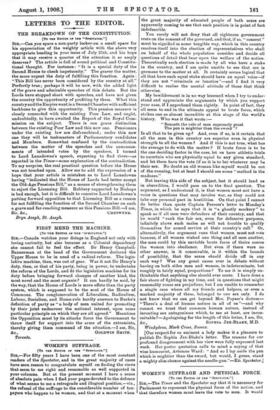WOMEN'S SUFFRAGE.
[To TEE EDITOR Or THE " SPECTATOR."]
Sin,—For fifty years I have been one of the most constant readers of the Spectator, and in the great majority of cases have seen mason to congratulate myself on finding the views that seem to use right and reasonable so well supported in your columns. But at the present moment I have a sense of absolute pain when I find your pages devoted to the defence of what seems to me a retrograde and illogical position,—viz., the refusal of the suffrage to the considerable number of tax- payers who happen to be women, and that at a moment when the great majority of educated people of both sexes are apparently coming to see that such position is in point of fact indefensible.
You surely will not deny that all righteous government rests on the consent of the governed, and that, if so, " consent " must be signified in some tangible way, which in this country resolves itself into the election of representatives who shall on behalf of the whole population consider and decide all questions of detail that bear upon the welfare of the nation. Theoretically such election is made by all who have a stake in the country, and I am quite unable to see that sex is germane to the matter at all. It certainly seems logical that all that have such equal stake should have an equal voice—if they are not " criminals or lunatics "—and I find it very difficult to realise the mental attitude of those that think otherwise.
My bewilderment is in no way lessened when I try to under- stand and appreciate the arguments by which you support your case, if I apprehend them rightly. In point of fact, they all seem to end in the ultimate appeal to brute force, which strikes one as almost incredible at this stage of the world's history. Who was it that wrote :— " Beneath the rule of men supremely great The pen is mightier than the sword"?
Is all that to be given up ? And, even if so, is it certain that all the men in this country are superior even in physical strength to all the women ? And if this is not true, what has the average to do with the matter If brute force is to be the one deciding factor in the case, let us have athletic trials to ascertain who are physically equal to any given standard, and let them have the vote (if so it is to be) whatever may be their sex. No doubt an old woman like myself would be out of the running, but at least I should see some " method in the madness."
But leaving this side of the subject, lest it should land us in absurdities, I would pass on to the final question. The argument, as I understand it, is that women must not have a voice in questions that may involve war, as they could not take any personal part in hostilities. On that point I cannot do better than quote Captain Ferrers's letter to Monday's Times, in which he says that it is "a ghastly mockery" to speak as if all men were defenders of their country, and that he would " rank the fair sex, even for defensive purposes, infinitely above such males as will not trouble to qualify themselves for armed service at their country's call." Or, alternatively, the argument runs that women must not vote because, if all women wished one thing and all men another, the men could by this enviable brute force of theirs coerce the women into obedience. But even if there were no other answer, is it conceivable, is it within the bounds of possibility, that the sexes should divide off in any such way ? Was any great cause ever in debate without having on both sides men and women, in indeterminate, but roughly in fairly equal, proportions ? To me it is simply un- thinkable that anything else should ever occur. I have done a fair share of fighting in my time, and in questions that might reasonably rouse sex prejudices, but I am unable to remember a single case where all my friends and helpers, or even a marked majority of them, belonged to one sex only. I do not know that we can get beyond Mrs. Poyser's dictum- " There's a deal of human nature in all of us "—and why cannot we trust that common human nature, instead of inventing sex antagonisms which, to me at least, are incon- ceivable ?—Apologising for the length of this letter, I am, Sir, Windydene, Mark Cross, Sussex.
[Our respect for so eminent a lady makes it a pleasure to publish Dr. Sophia Jex-Blake's letter. The reasons for our profound disagreement with her view were fully expressed last week. Her poetic quotation calls to mind a saying of that wise humourist, Artemus Ward : " And so I lay aside the pen which is mightier than the sword, but would, I guess, stand a mighty slim chance against the needle-gun."—ED. Spectator.]


































 Previous page
Previous page